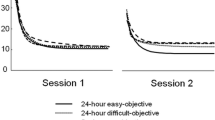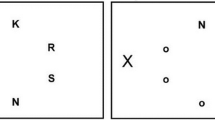Abstract
People continuously adapt their movements to ever-changing circumstances, and particularly in skills training and rehabilitation, it is crucial that we understand how to optimize implicit adaptation in order for these processes to require as little conscious effort as possible. Although it is generally assumed that the way to do this is by introducing perturbations gradually, the literature is ambivalent on the effectiveness of this approach. Here, we tested whether there are differences in motor performance when adapting to an abrupt compared to a ramped visuomotor rotation. Using a within-subjects design, we tested this question under 3 different rotation sizes: 30-degrees, 45-degrees, and 60-degrees, as well as in 3 different populations: younger adults, older adults, and patients with mild cerebellar ataxia. We find no significant differences in either the behavioural outcomes, or model fits, between abrupt and gradual learning across any of the different conditions. Neither age, nor cerebellar ataxia had any significant effect on error-sensitivity either. These findings together indicate that error-sensitivity is not modulated by introducing a perturbation abruptly compared to gradually, and is also unaffected by age or mild cerebellar ataxia.








Similar content being viewed by others
Data availability
The datasets generated during and/or analysed during the current study are available in the Open Science Framework repository, https://osf.io/c5ezv/.
Code availability
All data can be found on the OSF repository: https://osf.io/c5ezv/. Data processing and analysis scripts can be found at https://github.com/thartbm/GradualTwoRate.
References
Alhussein L, Hosseini EA, Nguyen KP et al (2019) Dissociating effects of error size, training duration, and amount of adaptation on the ability to retain motor memories. J Neurophysiol 122:2027–2042. https://doi.org/10.1152/jn.00387.2018
Bond KM, Taylor JA (2015) Flexible explicit but rigid implicit learning in a visuomotor adaptation task. J Neurophysiol 113:3836–3849. https://doi.org/10.1152/jn.00009.2015
Buch ER, Young S, Contreras-Vidal JL (2003) Visuomotor adaptation in normal aging. Learn Mem 10:55–63. https://doi.org/10.1101/lm.50303
Butcher PA, Ivry RB, Kuo S-H et al (2017) The cerebellum does more than sensory prediction error-based learning in sensorimotor adaptation tasks. J Neurophysiol 118:1622–1636. https://doi.org/10.1152/jn.00451.2017
Coltman SK, van Beers RJ, Medendorp WP, Gribble PL (2021) Sensitivity to error during visuomotor adaptation is similarly modulated by abrupt, gradual, and random perturbation schedules. J Neurophysiol 126:934–945. https://doi.org/10.1152/jn.00269.2021
Criscimagna-Hemminger SE, Bastian AJ, Shadmehr R (2010) Size of error affects cerebellar contributions to motor learning. J Neurophysiol 103:2275–2284. https://doi.org/10.1152/jn.00822.2009
Eggert T, Henriques DYP, ‘t Hart BM, Straube A (2021) Modeling inter-trial variability of pointing movements during visuomotor adaptation. Biol Cybern 115:59–86. https://doi.org/10.1007/s00422-021-00858-w
Gibo TL, Criscimagna-Hemminger SE, Okamura AM, Bastian AJ (2013) Cerebellar motor learning: are environment dynamics more important than error size? J Neurophysiol 110:322–333. https://doi.org/10.1152/jn.00745.2012
Heuer H, Hegele M (2008) Adaptation to visuomotor rotations in younger and older adults. Psychol Aging 23:190–202. https://doi.org/10.1037/0882-7974.23.1.190
Hull C (2020) Prediction signals in the cerebellum: beyond supervised motor learning. eLife 9:e54073. https://doi.org/10.7554/eLife.54073
Hulst T, van der Geest JN, Thürling M et al (2015) Ageing shows a pattern of cerebellar degeneration analogous, but not equal, to that in patients suffering from cerebellar degenerative disease. Neuroimage 116:196–206. https://doi.org/10.1016/j.neuroimage.2015.03.084
Hulst T, Mamlins A, Frens M et al (2020) Can we improve slow learning in cerebellar patients? bioRxiv https://doi.org/10.1101/2020.07.03.185959
Hussain SJ, Morton SM (2014) Perturbation schedule does not alter retention of a locomotor adaptation across days. J Neurophysiol 111:2414–2422. https://doi.org/10.1152/jn.00570.2013
Ingram HA, van Donkelaar P, Cole J et al (2000) The role of proprioception and attention in a visuomotor adaptation task. Exp Brain Res 132:114–126. https://doi.org/10.1007/s002219900322
Kagerer FA, Contreras-Vidal JL, Stelmach GE (1997) Adaptation to gradual as compared with sudden visuo-motor distortions. Exp Brain Res 115:557–561. https://doi.org/10.1007/PL00005727
Kagerer FA, Contreras-Vidal JL, Bo J, Clark JE (2006) Abrupt, but not gradual visuomotor distortion facilitates adaptation in children with developmental coordination disorder. Hum Mov Sci 25:622–633. https://doi.org/10.1016/j.humov.2006.06.003
Kim HE, Morehead JR, Parvin DE et al (2018) Invariant errors reveal limitations in motor correction rather than constraints on error sensitivity. Commun Biol 1:19. https://doi.org/10.1038/s42003-018-0021-y
Klassen J, Tong C, Flanagan JR (2005) Learning and recall of incremental kinematic and dynamic sensorimotor transformations. Exp Brain Res 164:250–259. https://doi.org/10.1007/s00221-005-2247-4
Kluzik J, Diedrichsen J, Shadmehr R, Bastian AJ (2008) Reach adaptation: what determines whether we learn an internal model of the tool or adapt the model of our arm? J Neurophysiol 100:1455–1464. https://doi.org/10.1152/jn.90334.2008
McDougle SD, Bond KM, Taylor JA (2015) Explicit and implicit processes constitute the fast and slow processes of sensorimotor learning. J Neurosci 35:9568–9579. https://doi.org/10.1523/JNEUROSCI.5061-14.2015
Michel C, Pisella L, Prablanc C et al (2007) Enhancing visuomotor adaptation by reducing error signals: single-step (aware) versus multiple-step (unaware) exposure to wedge prisms. J Cogn Neurosci 19:341–350. https://doi.org/10.1162/jocn.2007.19.2.341
Modchalingam S, Vachon CM, ‘t Hart BM, Henriques DYP (2019) The effects of awareness of the perturbation during motor adaptation on hand localization. PLoS One 14:e0220884. https://doi.org/10.1371/journal.pone.0220884
Modchalingam S, Ciccone M, D’Amario S, ‘T Hart BM, Henriques DYP (2023) Adapting to visuomotor rotations in stepped increments increases implicit motor learning. Sci Rep 13(1):5022. https://doi.org/10.1038/s41598-023-32068-8
Morehead JR, Taylor JA, Parvin DE, Ivry RB (2017) Characteristics of implicit sensorimotor adaptation revealed by task-irrelevant clamped feedback. J Cogn Neurosci 29:1061–1074. https://doi.org/10.1162/jocn_a_01108
Neville K-M, Cressman EK (2018) The influence of awareness on explicit and implicit contributions to visuomotor adaptation over time. Exp Brain Res 236:2047–2059. https://doi.org/10.1007/s00221-018-5282-7
Robertson EM, Miall RC (1999) Visuomotor adaptation during inactivation of the dentate nucleus. NeuroReport 10:1029–1034
Schlerf JE, Galea JM, Bastian AJ, Celnik PA (2012) Dynamic modulation of cerebellar excitability for abrupt, but not gradual, visuomotor adaptation. J Neurosci 32:11610–11617. https://doi.org/10.1523/JNEUROSCI.1609-12.2012
Schlerf JE, Xu J, Klemfuss NM et al (2013) Individuals with cerebellar degeneration show similar adaptation deficits with large and small visuomotor errors. J Neurophysiol 109:1164–1173. https://doi.org/10.1152/jn.00654.2011
Smith MA, Ghazizadeh A, Shadmehr R (2006) Interacting adaptive processes with different timescales underlie short-term motor learning. PLoS Biol 4:e179. https://doi.org/10.1371/journal.pbio.0040179
Taylor JA, Klemfuss NM, Ivry RB (2010) An explicit strategy prevails when the cerebellum fails to compute movement errors. Cerebellum 9:580–586. https://doi.org/10.1007/s12311-010-0201-x
Taylor JA, Krakauer JW, Ivry RB (2014) Explicit and implicit contributions to learning in a sensorimotor adaptation task. J Neurosci 34:3023–3032. https://doi.org/10.1523/JNEUROSCI.3619-13.2014
Vachon CM, Modchalingam S, ‘t Hart BM, Henriques DYP (2020) The effect of age on visuomotor learning processes. PLoS One 15:e0239032. https://doi.org/10.1371/journal.pone.0239032
Vandevoorde K, Orban de Xivry J-J (2019) Internal model recalibration does not deteriorate with age while motor adaptation does. Neurobiol Aging 80:138–153. https://doi.org/10.1016/j.neurobiolaging.2019.03.020
Werner S, Schorn CF, Bock O et al (2014) Neural correlates of adaptation to gradual and to sudden visuomotor distortions in humans. Exp Brain Res 232:1145–1156. https://doi.org/10.1007/s00221-014-3824-1
Werner S, van Aken BC, Hulst T et al (2015) Awareness of sensorimotor adaptation to visual rotations of different size. PLoS One 10:e0123321. https://doi.org/10.1371/journal.pone.0123321
Acknowledgements
This work was supported by the Natural Science and Engineering Research Council. DYPH and AB are supported by the Vision Science to Applications program.
Author information
Authors and Affiliations
Contributions
DYPH, BM’t, TE, and AS contributed to the study conception and design. Data collection was performed primarily by AB, UC, BM’t, and TE. Data analysis was completed by BM’t. The manuscript was primarily written by AB, and approved by all authors.
Corresponding author
Ethics declarations
Conflict of interest
The authors have no competing interests to declare that are relevant to the content of this article.
Ethical approval
The protocols used in this study were approved by the York Human Participants Review Sub-committee and by the Ethics Committee of the Ludwig-Maximilians University, Munich (559–15).
Consent to participate
Informed consent was obtained from all individual participants included in the study.
Additional information
Communicated by Melvyn A. Goodale.
Publisher's Note
Springer Nature remains neutral with regard to jurisdictional claims in published maps and institutional affiliations.
Rights and permissions
Springer Nature or its licensor (e.g. a society or other partner) holds exclusive rights to this article under a publishing agreement with the author(s) or other rightsholder(s); author self-archiving of the accepted manuscript version of this article is solely governed by the terms of such publishing agreement and applicable law.
About this article
Cite this article
Bansal, A., ’t Hart, B.M., Cauchan, U. et al. Motor adaptation does not differ when a perturbation is introduced abruptly or gradually. Exp Brain Res 241, 2577–2590 (2023). https://doi.org/10.1007/s00221-023-06699-2
Received:
Accepted:
Published:
Issue Date:
DOI: https://doi.org/10.1007/s00221-023-06699-2




